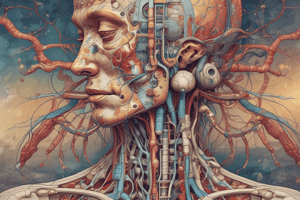Podcast
Questions and Answers
¿Cuál de las siguientes condiciones es un ejemplo de producción hormonal excesiva?
¿Cuál de las siguientes condiciones es un ejemplo de producción hormonal excesiva?
- Diabetes mellitus
- Hipotiroidismo
- Síndrome de Cushing (correct)
- Hipertensión secundaria
¿Cuál es la función principal del eje hipotálamo-hipófisis?
¿Cuál es la función principal del eje hipotálamo-hipófisis?
- Producción de hormonas sexuales
- Control de funciones endocrinas (correct)
- Control de la presión arterial
- Regulación de la temperatura corporal
¿Cómo actúan generalmente las hormonas peptídicas?
¿Cómo actúan generalmente las hormonas peptídicas?
- Atraviesando la barrera hematoencefálica
- Uniendo a proteínas de transporte
- Activando receptores en la superficie celular (correct)
- Difundiendo a través de la membrana celular
¿Cuál de las siguientes interacciones hormonales se refiere a hormonas que tienen efectos opuestos?
¿Cuál de las siguientes interacciones hormonales se refiere a hormonas que tienen efectos opuestos?
¿Cómo se pueden diagnosticar trastornos endocrinos?
¿Cómo se pueden diagnosticar trastornos endocrinos?
¿Cuál es la función principal de la glándula pituitaria?
¿Cuál es la función principal de la glándula pituitaria?
¿Qué hormona produce la glándula tiroides para regular el metabolismo?
¿Qué hormona produce la glándula tiroides para regular el metabolismo?
¿Cuál de las siguientes opciones describe mejor la acción de las hormonas?
¿Cuál de las siguientes opciones describe mejor la acción de las hormonas?
¿Qué glándula produce hormonas involucradas en la respuesta al estrés?
¿Qué glándula produce hormonas involucradas en la respuesta al estrés?
¿Cómo se regula típicamente la secreción de hormonas?
¿Cómo se regula típicamente la secreción de hormonas?
¿Qué hormona es producida por las glándulas paratiroides?
¿Qué hormona es producida por las glándulas paratiroides?
¿Cuál es la función de la melatonina?
¿Cuál es la función de la melatonina?
¿Qué hormona se libera en respuesta a niveles altos de glucosa en sangre?
¿Qué hormona se libera en respuesta a niveles altos de glucosa en sangre?
Flashcards
Efectos sinérgicos
Efectos sinérgicos
Cuando dos o más hormonas trabajan juntas para amplificar el efecto de la otra.
Hormonas esteroideas
Hormonas esteroideas
Las hormonas que se unen a receptores dentro de la célula, como las hormonas sexuales.
Trastornos endocrinos
Trastornos endocrinos
Un desequilibrio en la producción o acción de hormonas, puede ser por exceso o deficiencia. Ejemplos: diabetes, hipotiroidismo, hipertiroidismo.
Eje hipotalámico-pituitario
Eje hipotalámico-pituitario
Signup and view all the flashcards
Hormonas peptídicas
Hormonas peptídicas
Signup and view all the flashcards
Endocrinología
Endocrinología
Signup and view all the flashcards
Hormonas
Hormonas
Signup and view all the flashcards
Glándula pituitaria
Glándula pituitaria
Signup and view all the flashcards
Pituitaria anterior
Pituitaria anterior
Signup and view all the flashcards
Pituitaria posterior
Pituitaria posterior
Signup and view all the flashcards
Hormona paratiroidea
Hormona paratiroidea
Signup and view all the flashcards
Glándulas suprarrenales
Glándulas suprarrenales
Signup and view all the flashcards
Insulina y glucagón
Insulina y glucagón
Signup and view all the flashcards
Study Notes
General Concepts
- Endocrinology is the study of hormones and their actions.
- Hormones are chemical messengers that regulate various bodily functions.
- They are produced by specialized glands and tissues.
Major Endocrine Glands
- Pituitary gland: Located at the base of the brain; it is often called the "master gland" because it controls the function of many other endocrine glands.
- Anterior pituitary: Secretes hormones that regulate growth, metabolism, and reproduction. (e.g., growth hormone, thyroid-stimulating hormone, adrenocorticotropic hormone).
- Posterior pituitary: Stores and releases hormones produced by the hypothalamus (e.g., oxytocin, antidiuretic hormone).
- Thyroid gland: Located in the neck; produces hormones that regulate metabolism (e.g., thyroxine, triiodothyronine).
- Parathyroid glands: Four small glands located behind the thyroid; produce parathyroid hormone, which regulates calcium levels in the blood.
- Adrenal glands: Located on top of each kidney; produce hormones involved in stress response (e.g., cortisol, adrenaline).
- Adrenal medulla: Secretes catecholamines (epinephrine and norepinephrine).
- Adrenal cortex: Secretes corticosteroids like cortisol and aldosterone.
- Pancreas: Located behind the stomach; produces hormones that regulate blood glucose levels (e.g., insulin, glucagon).
- Gonads: Ovaries (female) and testes (male); produce sex hormones (e.g., estrogen, progesterone, testosterone) that regulate sexual development and reproduction.
- Pineal gland: Located in the brain; secretes melatonin, which regulates sleep cycles.
Hormone Action
- Hormones bind to specific receptors on target cells.
- The binding triggers a series of biochemical events that lead to a cellular response.
- Hormone action can be stimulatory or inhibitory, depending on the specific hormone and target cell.
- Hormones are often regulated through negative feedback loops, maintaining homeostasis.
Regulation of Hormone Secretion
- Secretion is often controlled by:
- Negative feedback systems: A hormone's effect inhibits its own secretion. If blood hormone levels get too high, the system reduces production.
- Nervous system inputs: The nervous system can directly influence endocrine gland activity.
- Other hormones: Several hormones act on other endocrine glands. This is a hallmark of the complex interplay within the endocrine system.
Disorders of Endocrine Function
- Endocrine disorders arise from insufficient or excessive hormone production.
- Examples include diabetes mellitus (insulin deficiency or resistance), hypothyroidism (low thyroid hormone), hyperthyroidism (high thyroid hormone), and Cushing's syndrome (high cortisol).
Hormonal Interactions
- Synergistic effects: Two or more hormones may amplify each other's actions.
- Antagonistic effects: Two or more hormones may have opposing effects. Often seen in blood sugar regulation, for instance.
- Permissive effects: One hormone may need to be present for another hormone to exert its effects.
Hypothalamic-Pituitary Axis
- The hypothalamus and pituitary gland work in conjunction to regulate many endocrine functions.
- The hypothalamus produces regulating hormones that affect the anterior pituitary.
- The anterior pituitary then releases tropic hormones to stimulate other endocrine glands.
Mechanism of Hormone Action
- Peptide hormones usually act through second messenger systems, which involve intracellular signaling pathways.
- Steroid hormones typically diffuse across cell membranes and bind to intracellular receptors. This complex then alters gene expression thus promoting or inhibiting production of proteins within the cell.
Hormonal Transport
- Most hormones circulate in the blood, often bound to transport proteins for stability and to alter their rate of clearance.
- The level of a hormone in the blood is an important measure of its activity.
Clinical Applications
- Endocrine disorders can be diagnosed through blood tests, imaging studies, and other tests.
- Treatment options include hormone replacement therapy and other medications.
Studying That Suits You
Use AI to generate personalized quizzes and flashcards to suit your learning preferences.
Description
Este cuestionario te ayudará a repasar los conceptos fundamentales de la endocrinología, incluyendo las principales glándulas endocrinas y sus funciones. Descubre cómo las hormonas actúan como mensajeros químicos en el cuerpo y regulan diversas funciones vitales.



